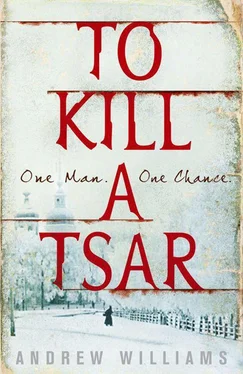‘Can I help Your Excellency?’
A young footman, his uniform and hair thick with dust, had slipped into the room with the silent discretion of the better sort of servant. In answer to Dobrshinsky’s question, he confirmed the tsar had not sat for dinner at the appointed hour but had been kept waiting by Prince Alexander of Hesse who had been late arriving at the palace. This impropriety on his brother-in-law’s part had probably saved the lives of the emperor and his family.
There would be questions, changes, Dobrshinsky thought as he made his way carefully down the dark stairs. Those who gave thanks to God for saving their emperor were unlikely to ascribe the failure in security to his hand too. There would be many — like General Gourko — who would account the Third Section responsible. The clamour for vengeance and arrests would be deafening.
A crowd was gathering beyond the cordon in the square, and some simple souls were singing a hymn of praise to the Virgin, standing in the driving snow with their heads bent in thanks for the deliverance of their tsar. Were these the people the terrorists were acting in the name of? Dobrshinsky wondered. Mikhailov, Figner, Perovskaya — what did they know of the will of the people? He elbowed his way roughly through the cordon and walked quickly across the square to where his carriage was waiting in front of the General Staff Building. The driver was shivering on the box, nipping surreptitiously at a bottle of vodka wrapped in brown paper.
‘The House of Preliminary Detention, and quick about it,’ Dobrshinsky barked.
He would not leave the Jew’s cell until he’d squeezed every last drop of advantage from him. Every last drop.
The wounded began arriving at the Nikolaevsky in the hour after the explosion. Sixty casualties, soldiers and palace servants, severed limbs and broken bones, severe blast burns and shock. Frederick Hadfield assisted as a colleague operated on one of the soldiers — no more than nineteen years of age — his chest crushed by falling masonry, his right leg attached by only a white sliver of bone. His chances of survival were slim: a tall fair-haired Finnish soldier who would die because he had the misfortune to be on duty at that hour. Had The People’s Will given him a thought? Hadfield wondered. No one was sure how many men had died in the guard room or how many would die of their wounds in the days to come. And yet not a hair of the tsar’s head had been harmed in the attack. On the hospital wards the wounded could hear the city’s bells rejoicing at his escape. For most of the evening, Hadfield was too busy to give it more than a passing thought, but there were moments — restraining a man with agonising burns over most of his body, and at the bedside of the young Finnish soldier — when he found himself trembling with anger and guilt.
At a little before eleven, the superintendent of the hospital visited the ward where most of the injured were being treated with General Gourko. In a stentorian voice he informed them they would be receiving a royal visitor within the hour and no one was to leave the hospital.
‘The tsar or tsarevich,’ one of Hadfield’s colleagues whispered. ‘The governor wouldn’t be here for anyone else.’
The corridors echoed with shouted orders as guards were posted on the neighbouring wards and at the entrances to the hospital wing. The beds were given fresh covers, porters arrived to scrub the floor, clean uniforms were issued to the nurses and the doctors straightened their ties and brushed their tailcoats. Hadfield could sense the excitement of those wounded men who were conscious enough to be aware of the preparations. What would Anna say if she could see them refusing pain relief or a sleeping draught lest they miss an opportunity to greet their tsar?
A short time later, the regular beat of military steps and the presentation of arms signalled the arrival of the royal entourage. Hadfield stood to attention as the superintendent had bidden them to do for the Emperor of All the Russias. And then the man Anna and her comrades called a tyrant, the despot, the divine villain, stood before them tired and bent, his face drawn and an unhealthy yellow. He cut a lonely figure in the doorway with his staff a respectful step behind, and for a moment he seemed uncertain what he should do. Collecting himself, he turned to speak to the hospital superintendent, then walked with him to the bed of the nearest wounded soldier. After a few minutes he moved on, stopping and talking to each man in turn, regardless of whether they were capable of replying, pressing a small olive wood cross into their hands. And as he moved closer, Hadfield found even his own heart beating a little faster, caught up in the reverence of the room, the mystery of monarchy.
‘Your Majesty, may I present Dr Frederick Hadfield?’ said the superintendent. ‘The nephew of His Excellency, General Glen.’
The emperor acknowledged Hadfield’s bow with a weak smile and said in French: ‘Can you understand such a thing, Doctor?’
‘No, Your Majesty.’
The emperor stared at him for a moment and Hadfield was struck by the softness, melancholy perhaps, in his large brown eyes. Then he turned to the Finnish soldier in the bed beside him. ‘Poor fellow. Is he badly injured? Please give him this when he recovers consciousness.’ He took one of the crosses from the superintendent and placed it on the cover.
‘Your Majesty,’ Hadfield said with another bow.
The tsar moved on, passing from bed to bed until he stood at the door again. After exchanging a few words with General Gourko, he glanced wearily to the ward for the last time before he turned to leave. Hadfield picked the little wooden cross from the bedcover and placed it on the soldier’s pillow. The young man’s face was livid and stiff, his body heaving then falling back, air rasping in his throat as he fought for breath. Badly injured? He would never know his emperor had stood at his bedside. By the morning he would be gone.
It was almost two o’clock in the morning when Hadfield left the hospital, and for the first time in days the night was still and clear, the sky frosted with stars. He stood for a few minutes at the entrance, grateful for the sharp air in his lungs and its prickle on his face. He could hear the muffled drumming of hooves in the street, shouted orders and the jingle of cavalry harnesses. The police and army had secured the city’s main thoroughfares in a show of strength, just as they had done after the first attempt on the tsar a year ago. The journey home would be painfully slow, with questions to answer at half a dozen checkpoints. But he had no mind to go there anyway. He wanted to walk quickly, hard exercise to free his mind from a confusing fog of thoughts and feelings. Walk, walk away from the hospital and wounded soldiers, the tsar and those who sought to kill him, walk and keep walking.
He was not sure how he found his way to Malaya Italyanskaya Street or quite what drove him there at that late hour, but he was relieved to see the lights still burning in George Dobson’s study. They had seen very little of each other in recent weeks. Hadfield had spent most of his evenings either in Anna’s company or more usually waiting to hear from her. His friend was in love too — or infatuated — with a ‘graceful creature’ called Natalya, a dancer with the Mariinsky Company. Was she with him now? Hadfield was too empty and tired to feel anything but indifferent to the embarrassment he might cause.
Fortunately, Dobson was writing his account of the attack on the palace. He stood at the door in his shirt sleeves, a cigar smoking between inky fingers.
‘Goodness gracious, Hadfield, you’ve heard the news!’
‘Yes. May I come in?’
For a moment, he stared at Hadfield distractedly, his eyes glittering with excitement, lost perhaps in a half-written line. Then, ‘My dear fellow, of course,’ and he stepped aside to let him pass. ‘What on earth are you doing here at this hour?’
Читать дальше












